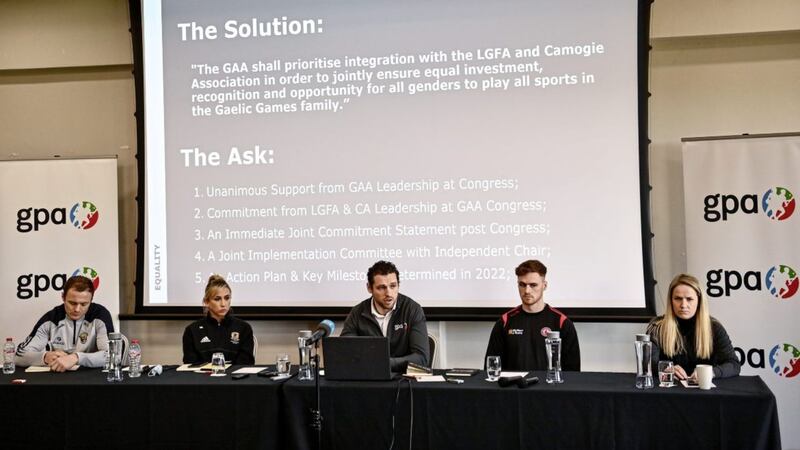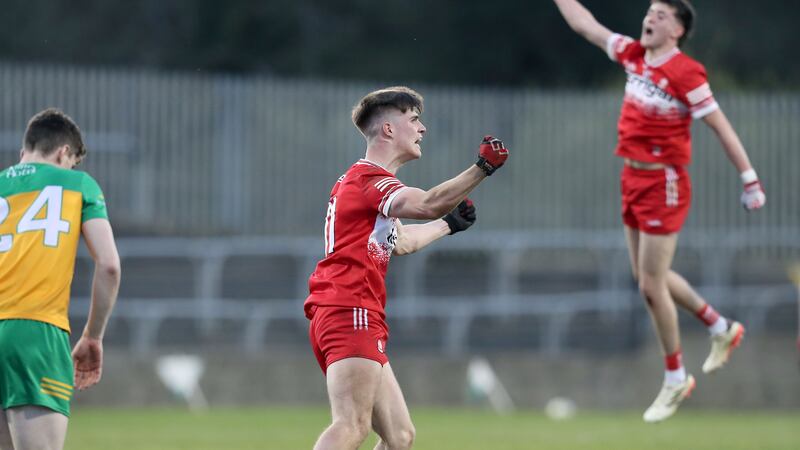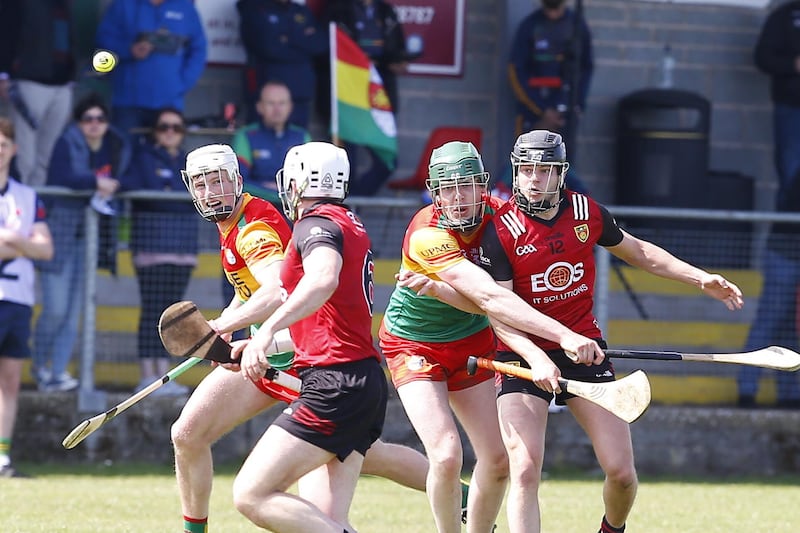“This is an opportunity for the GAA, the Camogie Association, and the LGFA to create the change. We are not saying ‘This is exactly how you should do it, this is how you should set yourself up’. We’re saying ‘This needs to happen, you guys need to figure out how.’”
That comment about achieving integration and gender equality appeared to be said with absolute sincerity by Matthew O’Hanlon, the Wexford hurler who is also the co-chair of the Gaelic Players Association’s National Executive Committee.
Yet - to borrow imagery from another sport - if the ball is now in the court of the GAA, the Camogie Association, and the LGFA, it’s one that’s been hit with vicious top-spin by the GPA.
The devil will be in the detail, and working it all out will be far from easy.
As the man, and the woman, even the child says, ‘that’s easier said than done’.
It should be done though.
And sooner rather than later.
The GPA’s frustration with the faffing and foot-dragging over integration is evident and understandable.
It’s now getting on for 19 years since then GAA President Sean Kelly established a working group on integration with a view to integration by the end of 2007.
As the GPA acknowledged, the LGFA were a stumbling block to an integration proposal made by Liam O’Neill when he was GAA President in 2013.
There’s a reluctance from some in the women’s bodies, fearing loss of independence and control.
The main issue from the men’s side, the GAA, is - let's be honest - money.
Paying expenses for twice as many county teams will stretch already limited resources.
Sure, economies of scale will reduce the extra costs somewhat, in terms of meals after training, perhaps, and shared medical/physio requirements, but there will still be a lot of extra travel and accommodation costs.
Yet it was evident even before the Covid pandemic that a brake needed to be put on spiralling inter-county spending.
Do male players really need all the boots and gear they've been getting? Surely they can spread the love and the half-zips around.
Hard questions will have to be asked, belts will have to be tightened, but money in Gaelic games should be spent more equitably as regards gender, if not quite equally, given the greater pulling power of men's teams for supporters, sponsors, and broadcasters.
Yet there's an alternative view. GPA National Executive Committee co-chair Matthew O'Hanlon, the Wexford hurlers, argues sponsorship can rise as a result of integration:
"Multinational companies that are backing Gaelic games, they will want to back male and females equally. And if they find they are only backing the male side, that support will decrease but policies are now in place in multinationals in terms of how they can sponsor teams and what they can do. It’s the ethical decisions they make to ensure it is done at an equal level. So that’s what we want."
That's the carrot.
Here's the stick: remember that the GAA received almost E30m in Covid-19 funding from the Irish government. That is money from taxpayers, male and female.
Gemma Begley, the GPA's Equality, Diversion, and Inclusion Manager, pointed out that Sport Ireland has a mandate to have 40 per cent of females in leadership and governance roles by the end of next year.
The former Tyrone Ladies Footballer saw her team have to pay for access to the county's Garvaghey training complex, and commented: ““It’s disappointing when you are a player and trying to challenge things like that.
"The disappointing thing as well is that when there is public funding being used for facilities like that, when females are used for fund-raising campaigns for the GAA team, and then to be treated like outsiders. It’s things like that make you feel like a second-class citizen.”
GPA CEO Tom Parsons expects the government to use its clout to effect change: "This needs everybody in society, including government officials, to not be bystanders but upstanders to ensure this happens.
"The policy for 2023 and the 40% minimum gender balance on all boards needs to happen and can’t be just words on paper. There is definitely an expectation among the players that this will be supported and driven by Sport Ireland and the government for sure.”
There's yet another source of income - supporters.
As with drivers on the roads complaining about ‘the traffic’, the GPA are ‘the GAA’, or at least a significant part of it, representing around 4,000 inter-county players across four codes.
This column has made this point before, but it retains its worth: women must help themselves too. Go to women’s matches. Buy women’s jerseys. Support women’s sponsors. If you’ve a choice to make between a match, a jersey, and a sponsor, choose the female side.
The same applies to men as well.
The women in your life back you, so you should back them.
There should be double-headers where possible - and then split the proceeds equally.
Armagh Ladies have done magnificent work to construct their own ground, McKeever Park, at Killeen - but they shouldn't have had to do so.
The idea of getting their 'own' grounds is based on the wrong premise, or premises, to be exact.
There are more than 2,200 club grounds in Ireland
Female teams in Gaelic games shouldn’t have to go cap in hard, begging for a place to play, nor a place to train.
As Begley pointed out, speaking from her own experience, many Club Tyrone members made clear that they had contributed towards the entire Tyrone Gaelic family, not just the men’s footballers.
GAA grounds may have mostly been built by male hands - but there’s absolutely no way they would have happened without the help and backing from many females.
Behind every great man…
At the very least, women looked after the children, taking them to various activities, put them to bed, cooked and cleaned homes, etc, while the men were doing the digging, levelling, building, plumbing, electrical work, plastering, painting, and so on. The women probably made the meals for the hungry workers too, washed their work clothes, bought and sold plenty of ballot tickets.
It’s not the 1950s any more.
Tyrone footballer Conor Meyler has called for greater empathy and understanding from male players.
To paraphrase the old saying, ‘Before you judge a woman, walk a mile in her shoes.’
I’m not telling hulking fellas to strap on the stilettos - although, if that’s your bag, go right ahead, genuinely. However, the point is valid: one can’t really understand the experience of other unless you’ve been through it.
Sometimes that’s impossible for men, such as childbirth, but that should simply be the starting point of our gratitude to women.
Many/ most of us have strong mothers and inspiring, intelligent sisters, wonderful wives and delightful daughters.
Let's support them properly.
The solution may come from the bottom up rather than from the top down.
The ‘One Club’ approach needs to be rolled out across Ireland, with Begley acknowledging that she was always treated fairly at club level.
With an 'all for one and one for all' attitude, club delegates can then speak for all four codes.
Start by speaking up at Congress this weekend, then turn the talk into action at last.








